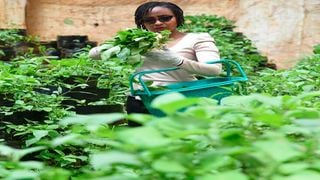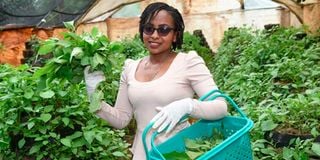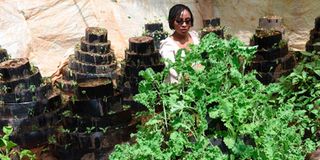
Ms Mutile Wambua, 34, harvests nightshade vegetables (managu) at her farm in Yamumbi, Uasin Gishu County.
| Jared Nyataya | Nation Media GroupSeeds of Gold
Premium
Tiny space, big harvest: My 65 storey gardens
What you need to know:
- Mutile Wambua's 65 gardens hold 4,550 plants that can occupy up to an acre depending on the spacing between the crops.
- Her initial capital was Sh20,000, which she spent on making six-storey gardens and buying seeds.
Mutile Wambua is dressed in a black skirt, a cream blouse, white gloves and gumboots as she checks crops in a greenhouse on her farm in Yamumbi village off the Rivatex-Ndalat Road in Eldoret.
The 34-year-old stops at one plant, flips its leaves to ascertain if there are any pests before moving to the next.
“This is my office. This is where I report every day, it is what I live for,” says Wambua.
She grows a variety of traditional vegetables that include black nightshade (managu) and amaranth, spinach and dania.
Inside the 8 by 17m greenhouse are 65 multi-storey gardens where she farms the crops, with one holding an average of 70 plants.
“What a single storey garden holds would have covered eighth-acre piece of land,” says Wambua, who holds a degree in procurement from Moi University and a post-graduate diploma in the same field from Chartered Institute of Purchasing of Supply from United Kingdom.
The crops on her 65 storey gardens, Wambua says, would fit on several acres of land if she was farming them using the traditional method.

Ms Mutile Wambua, 34, harvests nightshade vegetables (managu) at her farm in Yamumbi, Uasin Gishu County.
“But farming should be urban and modern, especially for us the youth who may not have access to land. Besides, using the storey gardens makes it easier to manage the crops including by weeding,” says Wambua, who is also studying a masters degree in development studies from Catholic University of East Africa.
Her 65 gardens hold 4,550 plants that can occupy up to an acre depending on the spacing between the crops.
She started the vegetable project in 2019, where she farmed the crops on quarter acre under drip irrigation system. However, early this year she switched to storey gardens after learning the benefits from a friend.
Her initial capital was Sh20,000, which she spent on making six-storey gardens and buying seeds. She then propagated the seeds before planting them in the gardens.
“I put up the greenhouse later when birds attacked my crops and destroyed them. I used polythene sheets and the wooden poles to make the structure.”
But this is not her first farming project. Wambua says she has had the passion for farming since she was a child.
“I loved to see seeds breaking the soil and coming out. Besides, I want safer food,” notes Wambua, who grows her crops organically.
She first ventured into farming in 2012 after graduating from Moi University. She planted tomatoes and vegetables using the conventional method. Two years into the project, however, she abandoned the venture after getting a job.
“I later quit due to low pay and went back to farming where I also helped my family run our poultry business.”
She uses rabbit urine as foliar fertiliser and pesticide and intercrops her controls with red pepper and onions to control pests and diseases. She mixes compost manure and top soil in a ratio of the 50:50 for the growing media.
“I harvest between 100 and 200 kilos of vegetables from the farm every week, selling a kilo at Sh50. In a month, I get at least 3,200 kilos,” Wambua who sells directly to customers says, adding during dry season, the prices go up to between Sh70 to Sh80 a kilo.
Besides running the farm, she manages a family business where they sell animal feeds, poultry and poultry equipment and further does consultancy on farm management.
Her plan is to have at least three more greenhouses to meet the growing demand for organic crops.
“Farming is a rewarding venture. There are challenges which require patience and persistence. It is also important to conduct market survey or research before venturing into any farming,” says Wambua, who has employed one worker.

Ms Mutile Wambua, 34, tends to a storey garden with curled kales, at her farm in Yamumbi, Uasin Gishu County.
She notes that storey gardens are good for the youth who want to practice farming since the method doesn’t require much space.
Patrick Kalama, a research scientist at Kenya Agricultural Livestock Research Organisation in Kitale, says onion and red pepper contain allicin, an active chemical ingredient that produces natural pungent smell that helps the crops to repel pests.
“For organic farmers, the allicin is what pushes these pests away. Organic farming is becoming popular as more consumers become health conscious.”
Kalama notes rabbit urine contains high levels of nitrogen since rabbits don’t drink much water.
“Due to high level of nitrogen, the urine serves as the foliar feed for the crop. On the other hand, the pungent smell act as a repellent against a number of pests such as aphids.”
A farmer requires to mix urine and water in a ratio of 1:5 to make a solution to use as foliar feed or bio-pesticide. This means, one can mix one litre of urine with five liters of water,” added Kalama.





